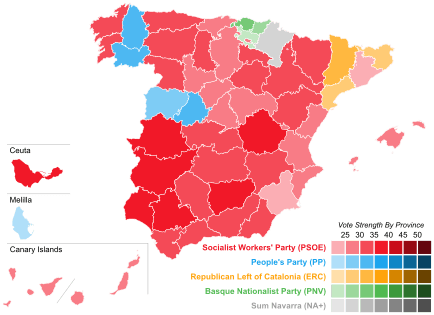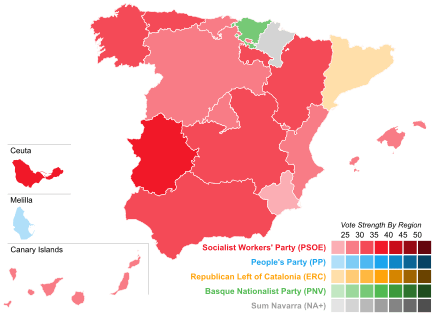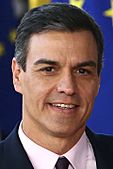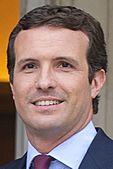April 2019 Spanish general election facts for kids
|
|||||||||||||||||||||||||||||||||||||||||||||||||||||||||||||||||||||||||||||||||||||||||||||
|
|
|||||||||||||||||||||||||||||||||||||||||||||||||||||||||||||||||||||||||||||||||||||||||||||
|
All 350 seats in the Congress of Deputies and 208 (of 266) seats in the Senate 176 seats needed for a majority in the Congress of Deputies |
|||||||||||||||||||||||||||||||||||||||||||||||||||||||||||||||||||||||||||||||||||||||||||||
|---|---|---|---|---|---|---|---|---|---|---|---|---|---|---|---|---|---|---|---|---|---|---|---|---|---|---|---|---|---|---|---|---|---|---|---|---|---|---|---|---|---|---|---|---|---|---|---|---|---|---|---|---|---|---|---|---|---|---|---|---|---|---|---|---|---|---|---|---|---|---|---|---|---|---|---|---|---|---|---|---|---|---|---|---|---|---|---|---|---|---|---|---|---|
| Opinion polls | |||||||||||||||||||||||||||||||||||||||||||||||||||||||||||||||||||||||||||||||||||||||||||||
| Registered | 36,898,883 |
||||||||||||||||||||||||||||||||||||||||||||||||||||||||||||||||||||||||||||||||||||||||||||
| Turnout | 26,478,140 (71.8%) |
||||||||||||||||||||||||||||||||||||||||||||||||||||||||||||||||||||||||||||||||||||||||||||
|
|||||||||||||||||||||||||||||||||||||||||||||||||||||||||||||||||||||||||||||||||||||||||||||

Constituency results map for the Congress of Deputies 
Autonomous community results map for the Congress of Deputies |
|||||||||||||||||||||||||||||||||||||||||||||||||||||||||||||||||||||||||||||||||||||||||||||
|
|||||||||||||||||||||||||||||||||||||||||||||||||||||||||||||||||||||||||||||||||||||||||||||
The April 2019 Spanish general election was a big vote held in Spain on Sunday, April 28, 2019. People voted to choose new members for the Cortes Generales, which is like Spain's parliament. They elected all 350 members of the Congress of Deputies and 208 members of the Senate.
About 71.8% of people who could vote actually did, which is a lot! The Spanish Socialist Workers' Party (PSOE), led by Prime Minister Pedro Sánchez, won the most votes and seats. This was the first time in eleven years that their party won a big national election. They also became the largest party in the Senate.
However, no single party won enough seats to have a clear majority on their own. This meant that the parties had to try and work together to form a coalition government. When they couldn't agree, Prime Minister Sánchez decided to call for a new election just seven months later, in November 2019.
Contents
Election Results
The election showed some big changes in how people voted. The PSOE gained many seats, becoming the strongest party. The People's Party (PP) lost a lot of seats, while Citizens (Cs) gained some. A new party called Vox also won seats for the first time, which was a big change in Spanish politics.
Main Parties and Their Leaders
- Spanish Socialist Workers' Party (PSOE) led by Pedro Sánchez: This party won the most seats, 123 out of 350. They got 28.7% of all the votes.
- People's Party (PP) led by Pablo Casado: This party came in second with 66 seats and 16.7% of the votes.
- Citizens (Cs) led by Albert Rivera: They won 57 seats and 15.9% of the votes.
- Unidas Podemos led by Pablo Iglesias: This group of parties won 42 seats and 14.3% of the votes.
- Vox led by Santiago Abascal: This party was new to the national parliament, winning 24 seats and 10.3% of the votes.
What Happened After the Election
Even though the PSOE won the most seats, they didn't have enough to form a government by themselves. They needed help from other parties. When the parties couldn't agree on how to work together, a new government couldn't be formed. Because of this, Prime Minister Pedro Sánchez stayed on as an "acting" Prime Minister, and another election was called for November 2019. This is sometimes called a "snap election" because it happens sooner than planned.
Images for kids
-
Outgoing prime minister Mariano Rajoy (right) congratulating incoming prime minister Pedro Sánchez (left) upon losing the no confidence vote on 1 June 2018.
-
Prime Minister Pedro Sánchez announcing a snap election for 28 April 2019.
See also
 In Spanish: Elecciones generales de España de abril de 2019 para niños
In Spanish: Elecciones generales de España de abril de 2019 para niños
 | William M. Jackson |
 | Juan E. Gilbert |
 | Neil deGrasse Tyson |









